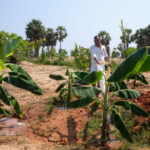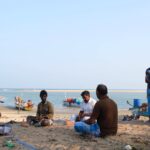This article was published more than 7 years ago.

From the global women’s marches to the #MeToo movement, it’s been quite a year for women in activism. As we close out 2017, the Fund for Global Human Rights is honoring women like Nymia with our #ShePersists campaign—a series of stories that showcase the courage, strength, and resilience of the women human rights defenders we support around the world. Donate here to support activists like Nymia and read on for her inspiring story.
Imagine being a young mother with two children, another on the way—and your husband in the crosshairs of your government’s intelligence agencies.
Imagine that, fearing for the safety of your children, you make the difficult decision to send them across an ocean to live with relatives.
Imagine witnessing your husband put behinds bars, unfairly imprisoned for speaking out against injustice.
And imagine that despite all of this, you persist.
Filipina activist Nymia Pimentel Simbulan doesn’t have to imagine; this is her reality. But instead of being silenced, Nymia channeled these experiences into her activism. Today, she is the Executive Director of the Philippine Human Rights Information Center (PhilRights), a grantee of the Fund for Global Human Rights that investigates, exposes, and advocates for an end to human rights abuses.
With PhilRights emerging as a vocal critic of Philippine President Rodrigo Duterte’s ongoing “war on drugs,” Nymia’s work is risky. But like so many of the women activists the Fund supports, Nymia refuses to give up when the going gets tough. It’s a persistence she has demonstrated since her days as a student activist protesting an authoritarian regime—a peaceful resistance that landed Nymia herself in jail.
Child of the Revolution
Born in 1955 in Quezon City, Nymia came of age during the brutal dictatorship of Ferdinand Marcos. Elected president in 1965, Marcos was responsible for the death, disappearance, and torture of tens of thousands of people. Over the course of his 21-year rule, he amassed a fortune worth up to $10 billion while the vast majority of Filipinos remained trapped in poverty.
Enraged by Marcos’ abusive government, ordinary civilians began taking to the streets en masse. Seeking to quell the demonstrations and solidify his grip on power, Marcos declared martial law in 1972. A student leader at the University of the Philippines at the time, Nymia flung herself headlong into the anti-dictatorship movement. Her activism caused state agents to keep a watchful eye on her actions until she was arbitrarily arrested and detained in 1974.
During a recent interview with the Fund, Nymia tearfully recalled how hard it was having her mother visit her in prison—something no parent wants to have to do. But Nymia also said that she held firm. “My imprisonment did not stop me from speaking out. I greatly attribute who I am now—my values, beliefs, attitudes—to my involvement in the progressive peoples’ movement. The people I have known and worked with, my experiences in the movement, have shaped me as a person.”
After six months behind bars, Nymia was released and resumed her activism. In 1977, a few months after graduating from college, she married Alfred, a fellow activist. “Marrying someone with similar political views and aspirations made me stronger,” said Nymia, who continued protesting the Marcos regime with Alfred by her side.
Nearly a decade later, Nymia joined hundreds of thousands of peaceful protesters on the streets of the Philippine capital of Manila. With the military backing the demonstrators’ cause, Marcos had no choice but to step down. Four days after the protests erupted, the dictator fled Manila with his family. It was a landmark victory that was decades in the making.
From Student Activist to Human Rights Advocate
During Marcos’ bloody reign, several anti-government armed groups emerged across the Philippines. In 1988, the new government erroneously identified Alfred, Nymia’s husband, as a top-ranking official of one of these groups—namely the armed wing of the Communist Party of the Philippines.
“They searched for my husband for two years,” said Nymia. “We were followed, our phone was tapped, and our house was raided. I was pregnant at the time. We had to send our four-year-old son and seven-year-old daughter to live with my in-laws in the United States to keep them safe.”
Then, in 1990, Nymia’s husband was arrested and detained in a military camp. During his detention, Nymia was invited to join an organization of families and friends of political prisoners, and began working for a group advocating for the release of political prisoners.
Fortunately, Nymia and Alfred were able to bring their children back to the Philippines, and Alfred was released from prison after 16 months. But even with her family safely reunited, Nymia could not abandon her human rights work. Her path eventually led her to Fund grantee PhilRights, where she has been the Executive Director since 2003.
One of the Philippines’ leading human rights organizations, PhilRights combines research, advocacy, and education to expose human rights violations, press for policy changes to end them, and teach communities to become activists themselves. Their education programs have equipped local communities to protect their children from being recruited as child soldiers, defend their land from companies seeking to exploit it, and access their right to health. Meanwhile, their investigations and relentless advocacy have played a key role in securing major policy wins, including the abolition of the death penalty in 2006—a triumph that the current government is looking to undo, prompting PhilRights to resume their campaigning against it.
These examples represent just a few of PhilRights’ victories over the years—successes that Nymia is proud to have played a role in. It’s a track record that has prepared PhilRights for the extreme challenge it faces today: curbing the horrific abuses being committed under Philippine President Rodrigo Duterte.
On the Frontlines of the Drug War
Immediately after taking office on June 30, 2016, President Duterte declared a national “war on drugs” and gave police and citizens alike his blessing to kill any and all members of the drug trade—from producers, to dealers, to suspected users. Eighteen months later, over 12,000 people have been executed by police and vigilantes. Despite ample evidence that the majority of the killings are unlawful, no one has been held accountable.
As impunity reigns, the death toll mounts.
Since Duterte launched his brutal drug war, PhilRights has been working to expose the abuses being committed, and to lessen their impact on families and communities. They conduct this work as part of the In Defense of Human Rights and Dignity Movement (iDefend)—a newly formed coalition that brings together over 40 non-governmental organizations (NGOs) to address urgent human rights issues.
PhilRights is playing a leading role in equipping iDefend member NGOs to conduct education, training, and organizing activities in the urban poor neighborhoods affected by the drug war. At the same time, they are monitoring the situation on the ground, interviewing family members of drug war victims and eyewitnesses.
Given that Duterte has threatened to grant security forces permission to shoot human rights defenders who “obstruct” his drug war, PhilRights’ work is incredibly dangerous. But despite her visibility as the head of the organization, Nymia worries more about her colleagues than herself.
“I am somewhat protected because I do not go into affected communities,” she said. “But my co-workers going into the urban neighborhoods where the killings occur—they get exposed.”
With several iDefend leaders now on the national police’s list of “Persons of Interest,” Nymia is taking a long, hard look at her organization’s security protocols. But despite the very real threats, she shows no signs of giving up.
“The situation itself dictates that something must be done,” said Nymia.
It’s a sentiment echoed by many of the women human rights defenders the Fund supports, all of whom share a core belief: that human rights matter, and that defending them is worth the risk.


